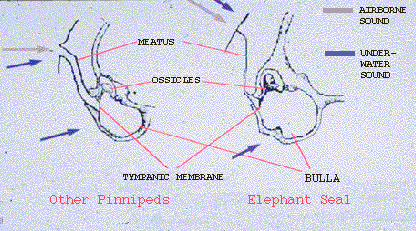What noises do marine animals hear?
The effects of ocean noise pollution on marine life depend on what sounds they can
hear: a topic scientists know very little about. Human hearing is limited to sounds within a
certain range of sound frequencies, and we hear certain pitches better than others. The
same is true for animals, but animal hearing abilities are often quite different from those of
humans, and vary among species. Dolphins communicate using high-pitched screeches
above the range of human hearing, while many whales speak in low moaning sounds.
Some animal ears hear only loud sounds; others are extremely sensitive.
Most louder man-made ocean noise, including tanker engines, low
frequency sonar, and ATOC, are near or below 100 Hz. So one of the most important
hearing question is: How well doanimals hear low-pitch sounds?
 Burnyce is one of the only elephant seals in the world who wears headphones.
Marine biologist Ron Schusterman and his research group at Long Marine Lab at the
University of California, Santa Cruz, strap headphones to Burnyce's head to help them
study elephant seal hearing. Schusterman and his research group are testing her ability to
hear different sound volumes and pitches. Whenever the blindfolded elephant seal hears a
sound she nudges a rubber-ended lever with her nose, and if she's correct, Schusterman
rewards her with a fish. And recently they completed the first ever study of elephant seal,
sea lion, and harbor seal hearing at frequencies below 100 Hz (about equal to the lowest
note on a cello).
Burnyce is one of the only elephant seals in the world who wears headphones.
Marine biologist Ron Schusterman and his research group at Long Marine Lab at the
University of California, Santa Cruz, strap headphones to Burnyce's head to help them
study elephant seal hearing. Schusterman and his research group are testing her ability to
hear different sound volumes and pitches. Whenever the blindfolded elephant seal hears a
sound she nudges a rubber-ended lever with her nose, and if she's correct, Schusterman
rewards her with a fish. And recently they completed the first ever study of elephant seal,
sea lion, and harbor seal hearing at frequencies below 100 Hz (about equal to the lowest
note on a cello).
They found that elephant seals hear better than other seals at these low frequencies.
This could be due to the larger size of the elephant seal's bulla - the inner ear
chamber. A large bulla, like a big stereo speaker, can resonate better at lower
pitches.

Unfortunately, scientists know far less about the hearing ability of other species. A
few labs have tested the hearing of bottlenosed dolphins and harbor porpoises. Most of
them can hear lower frequency sounds, but their hearing is far worse in that range. With
larger whale species, logistical problems prevent scientists from learning more about their
hearing ability. It's fairly difficult to bring a full grown whale into a tank and reward him
with 100 pounds of krill every time he presses a lever.
 Burnyce is one of the only elephant seals in the world who wears headphones.
Marine biologist Ron Schusterman and his research group at Long Marine Lab at the
University of California, Santa Cruz, strap headphones to Burnyce's head to help them
study elephant seal hearing. Schusterman and his research group are testing her ability to
hear different sound volumes and pitches. Whenever the blindfolded elephant seal hears a
sound she nudges a rubber-ended lever with her nose, and if she's correct, Schusterman
rewards her with a fish. And recently they completed the first ever study of elephant seal,
sea lion, and harbor seal hearing at frequencies below 100 Hz (about equal to the lowest
note on a cello).
Burnyce is one of the only elephant seals in the world who wears headphones.
Marine biologist Ron Schusterman and his research group at Long Marine Lab at the
University of California, Santa Cruz, strap headphones to Burnyce's head to help them
study elephant seal hearing. Schusterman and his research group are testing her ability to
hear different sound volumes and pitches. Whenever the blindfolded elephant seal hears a
sound she nudges a rubber-ended lever with her nose, and if she's correct, Schusterman
rewards her with a fish. And recently they completed the first ever study of elephant seal,
sea lion, and harbor seal hearing at frequencies below 100 Hz (about equal to the lowest
note on a cello).
